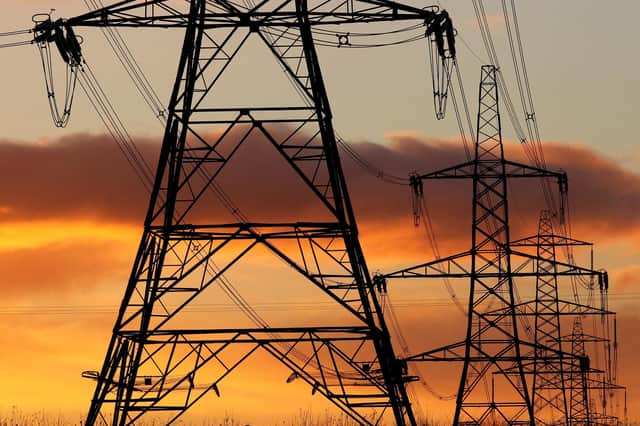Inaction is the best action right now… unless they’re trying to double your direct debit - Martin Lewis


It’s all due to an explosion in the cost of wholesale gas – and as in the UK we often use gas to generate electricity, the price of that is up too. No surprise many people are panicking, and I’ve been swamped with questions, so let me run through the most common ones (my answers are correct at the time of writing).
With prices rocketing, should I try to bag a cheaper deal?
No. Do nothing – the energy price cap is the cheapest deal. The price cap limits what providers can charge on their standard variable (default) tariffs. There are no meaningfully cheaper switches available right now.
Advertisement
Hide AdAdvertisement
Hide AdYou'll be on the price cap, or automatically moved to it, if: you've never switched, your cheap fix ends or your provider goes bust and you're moved to a new firm. So do nowt and you'll be on, or moved to, today's cheapest deal.The cheapest fixed deal is 35 per cent higher (around £450/year more for someone on typical bills). My best guess is that’s too much of a premium for most to move right now, but check for yourself by doing a whole of market comparison, either via my www.cheapenergyclub.com or any Ofgem-accredited site (there’s a list at www.ofgem.org.uk).I’ve heard the price cap is £1,277/yr, does that mean it's the most I can pay?No. 'Price cap' is a stupid name, it's more of a rate cap. There's no maximum you can pay for your domestic energy. The £1,277/yr figure is just what the cap would be for someone on the regulator's defined 'typical use'.
While it’s more complicated than this in reality, the best way to think of it is as a cap on the rate you pay for each unit of energy you use. So use more, and you pay more.Is it true the price cap will rise again in April?
Almost certainly yes, possibly by 30 per cent or more. Each cap lasts six months – the current one finishes on March 31. It's best to think of it as a six-month fixed tariff you can leave at any time if, and hopefully when, other tariffs get cheaper.We have a very good idea what the next cap will be because it’s based on average wholesale prices from Aug 2021 to Jan 2022, and we’re already a third of a way through that. Sadly, come April 1, the cap is expected to rise likely by at least 30 per cent (so £400/yr for someone with typical bills) – yet that'll still be less than today's cheapest fixes.Does all this apply to the whole of the UK?
No. It is correct for England, Scotland and Wales, but Northern Ireland has a different system. For more on that see www.consumercouncil.org.uk.
I'm comfortably in credit, but my firm's hugely hiked my direct debit, is this fair?It's not fair if it's out of proportion to the cost rise, and it's worrying. I'm hearing this a lot – some have seen their direct debit double. Generally, direct debits are designed to smooth out your energy costs across a year. Going into winter, it's normal to be a month or so in credit. So as the price cap has risen 12 per cent, if you're on it, expect a similar direct debit hike. If you're coming off a cheap fix and paying 30-40 per cent more, expect that too.Yet if you're in credit and your direct debit is rising way above the rate rise, there's an issue. But you don’t have to accept it. First, do a meter reading, so any direct debit calculation is based on up-to-date usage. Once that's processed, call and politely ask the firm to justify the hike. You've a right to a fair direct debit under energy firm licence conditions. If it can't, ask for the direct debit to be lowered. My concern is some firms are hiking direct debit right now to help their cash flow, even when it isn't justified.I'm on a cheap fix, should I leave it as I'm worried my firm may go bust?
No. To stick with my theme, do nothing, relish the cheapness while you can. If your firm goes bust, you'll almost certainly be moved to a new provider at the price cap, the cheapest you can get now anyway, and all your credit is protected (though, whichever firm you’re with, do screenshot now how much credit you have). So you may as well stick with your low rate for as long as you can.My energy firm (Pure Planet, Avro, Green etc) has gone bust. How much more will I pay?
For most on cheap fixes, shifting to the price cap will mean paying 10-40 per cent more than you were before. Though at least you saved in the meantime, and you’re now on the same rate you would’ve been on had you not switched. You can see a full list of all firms that have gone bust, who the new provider is, and the cost change at www.mse.me/EnergyShift
I'm really worried I can't afford to pay my bills – what do I do?
Advertisement
Hide AdAdvertisement
Hide AdEmergency pandemic rules mean your supply can't be cut off and prepay customers can get emergency credit. The best thing to do is communicate with your supplier, and let it know if you’re vulnerable. It may be able to offer payment reviews, breaks or reductions. Check if you’re eligible for the £140 Warm Home Discount (available from bigger firms if you’re on the guaranteed element of pension credit or on a low income and getting certain benefits).
Martin Lewis is the Founder and Chair of MoneySavingExpert.com
To join the 7.5 million people who get his free Money Tips weekly email, go to www.moneysavingexpert.com/latesttip
Comments
Want to join the conversation? Please or to comment on this article.